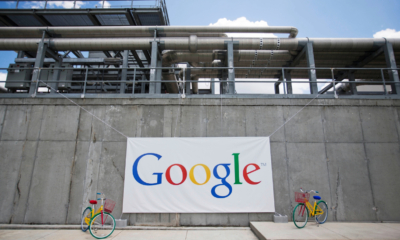SOCIAL
The Drum | What Should Brands Do During Pride?

Today, brands risk being the center of a social media storm for marketing that includes, or supports, the trans community. How is this affecting Pride campaigns this year?
The North Face, Adidas, Calvin Klein, Target, Woolworths, Glamour… in the past two weeks, these global brands have all faced criticism for marketing campaigns that show support for, and include the trans community. ‘Is this their Bud Light moment?’ ask headlines, stoking the flames of a culture war that shows no signs of abating.
Bud Light, of course, is now seen as a warning for what can happen when a social media backlash turns into a financial catastrophe. It ran a campaign earlier this year featuring the trans TikTok star Dylan Mulvaney. Outraged conservative consumers went on to boycott the brand and Bud, in response, quickly sacked the marketer in charge and issued an (arguably misjudged) apology. Yet sales have continued to slide, with the Dow Jones Market Tracker showing Bud parent company AB InBev’s market value, which had been $134.55bn before the campaign, has since dropped 20% to around $107bn.
Citing data from NielsenIQ, Jared Dinges, a beverage analyst at JPMorgan Chase, explains how a small but significant subset of American consumers “will not drink a Bud Light for the foreseeable future” and that this will likely lead to a “12% to 13% volume decline” this year. Modelo Especial has since become the number one beer in America, taking over from Bud in sales volume.
But the Bud backlash hadn’t dissuaded other global brands from embracing the trans community in their marketing efforts as part of the annual Pride movement, a celebration of LGBTQ+ inclusivity that has quickly become a key date in a CMO’s calendar.
Adidas released a swimsuit range in an ad fronted by a trans model and was accused of “erasing women”. The North Face, meanwhile, posted a tongue-in-cheek short on social media starring drag queen Pattie Gonia that was swiftly bombarded with complaints and led to a statement defending its choice of spokesperson.
South African fashion retailer Woolworths has been slammed for simply tweeting its support of the community while New Zealand retailer The Warehouse faced similar online backlash for a range of Disney-themed Pride merchandise.
In the UK, fashion publication Glamour faced right-wing criticism for a Pride-themed magazine issue that pictured pregnant transgender man Logan Brown on the cover.
Target wasn’t as quick to defend its Pride campaign after facing backlash for a range of LGBTQ+ products that included a ‘tuck-friendly swimsuit’. Rather than stand by its products – like rival Walmart who faced similar backlash just a few days later – the retailer removed the products from sale altogether.
According to media intelligence firm Cision, due to pulling Pride month merchandise, Target has now jumped to being the most-mentioned brand on social media in 2023 with 342,000 mentions relating to Pride, up from 10,000 in 2022.
Suggested newsletters for you
Even brands that have avoided comms around Pride 2023 are finding themselves embroiled in social media controversy. Despite having run in 2022, Calvin Klein made headlines for an ad promoting its sports bras that featured a bearded trans man as a model.
Jamie June Hill is a community member of Trans+ Adland, a grassroots community of trans, non-binary, gender non-conforming and intersex people in advertising. They say the response they have witnessed to brands that have included trans people in their marketing has led them to weep over their keyboard.
“The hate and violence towards brands simply willing to acknowledge trans people deserve to exist is just a taster of the violence and danger people like me now face almost every day online and in the street – in part thanks to the platform these moments of backlash are getting.
“Deep, deep down, my problem isn’t truly with them, or Calvin Klein or North Face or Adidas or the other brands I’m sure that will be dragged into the conversation. It’s with the people who are taking the tiniest bit of representation and weaponizing it into a force so brutal these companies feel the need to bend to its will for safety.”
Are brands retreating?
The question CMOs and CEOs have been asking in recent weeks is what exactly they should do for Pride this year. Do they double down on support and risk the financial consequences if anti-LQBTQ+ activists take a stand against their efforts? Or do they quietly do nothing at all?
Data provider AlphaSense/Sentieo has found that executives mention the words ‘LGBT’ and ‘LGBTQ’ less often on earnings calls this year, according to the FT.
Benjamin Cohen, the CEO of global LGBTQ+ publisher PinkNews, tells The Drum that in the lead-up to Pride this year brands have been “a bit more guarded“ than he would have liked in their marketing, likely as a result of the negative media attention the aforementioned brands have suffered when their campaigns catch the attention of vocal right-wing groups.
“We live in a divided world and it is likely wrong for a brand to consider the 330 million people in the US through one lens nor the nearly 70 million in the UK. It is the case that some are socially conservative anti-LGBTQ+ people, while there are others – many others – who take the opposite view. That is the true majority and to ignore them makes zero business sense.”
Despite the business case to be made, the hesitation among nervous marketers led Outvertising, an advocacy group for LGBTQ+ inclusion in marketing and advertising, to rally the most prominent organizations in the industry to encourage brands to continue with their campaigns regardless of the risk.
It issued a letter: “The trans+ community is weathering the brunt of this targeted campaign of hate and they must be protected. But this hate is not limited to our trans+ friends – the whole LGBTQIA+ community feels the effects. There’s no room for performative gestures or empty commitments in 2023: love is love, but money talks.”
The letter was endorsed by 64 organizations, including the World Federation of Advertisers, Isba, the Advertising Association, Stonewall, Nabs and Wacl as well as Ogilvy, Grey London, Dentsu, VMLY&R and Publicis.
Marty Davies, joint CEO at Outvertising, tells The Drum that the economic incentive will always be the biggest driver for decision-making from business leaders and that it’s naive to think that won’t be at play when it comes to what, if anything, to do during Pride month.
“I’m sure that CMOs are in meeting rooms across the UK and the US right now wondering whether running their ad with a trans+ person in it makes financial sense,” they say. “The truth is, if you run an advert this Pride month with a trans+ person in it, you will get backlash – I don’t like that it’s true, but it is true. The question brand leaders should be asking is not whether they should run the ad, but whether the ad will pay off for them in the long run.”
As we edge further into Pride month, announcements of campaigns increasingly come with statements that anticipate a backlash, with many brands stating that whatever criticism is thrown their way they will stand by their actions.
Encouragingly for brands that do commit, Cision found that social mentions of ‘pride’ and ‘LGBT+’ during the last week of May into the first week of June 2023 show a 211% surge in volume and have an overall positive sentiment, derived from terms including ‘happy’, ‘community’, ‘love’, ‘celebrate’ and ‘support’. Positive sentiment overall is at 34% for June, up from 9% in May, despite the controversies surrounding major brands heading into the month.
Finally, an end to rainbow-washing?
Performative marketing around Pride has always been an issue. For too long, brands have thought they could win the ’pink pound’ with a temporary logo change, a couple of social posts and the odd bit of themed merchandise. So prevalent is the problem that the term ‘rainbow-washing’ was created to describe companies that commercialize Pride and fail to advocate for the community all year round.

But now the stakes are higher and there’s commercial risk involved, the brands most guilty of this practice will be easy to spot.
“If you’re looking to ensure your brand is future-proof and set yourself up for success with the next, and queerest generation ever, then the immediate hit you take from the negative tweets and subsequent column inches will invariably be a blip on the long-term investment,” says Outvertising’s Davies.
“However, if you’re not 100% backing the trans+ people you platform, all you’ll do is upset people from both sides of the ‘culture war’, meaning some very vocal anti-trans folk will boycott you – and so will the LGBTQIA+ community and their allies for your hollow attempt at support.”
Target and Bud Light are case studies for how not to handle criticism. Shortly after the backlash started, the beer brand rowed back on the campaign and issued an apology from its CEO, which left Mulvaney saying she felt abandoned.
“It lost out not only on the custom from those willing to fire an AR-15 into their 24-pack but also the custom of the community it was hoping to engage in the first place,” says Davies.
Target’s attempt to satisfy conservative activists was to relocate its Pride displays to the back of some stores and remove some items altogether, stoking the anger of LGBTQ+ advocates. Within a week, its share price had slid 9%.
Davies adds: “If you’re not willing to go all in, then not only are you hurting your brand, you’re hurting our community and impacting my life. We could both do without that.”
It’s a sentiment echoed by Pink News’s Cohen, who says that brands that turn up with messages of support in the few weeks surrounding Pride, but ignore LGBTQ+-led media and the community the rest of the year, will achieve nothing more than backlash from homophobes and transphobes.
“Brands that are nervous need to consider what percentage of those reached send negative feedback. Even with orchestrated hate campaigns, only a tiny percentage will post negative comments. Thoughtful campaigns are needed to access the huge share of wallet that LGBTQ+ people and allies hold. There is a clear business case for targeting this group of consumers with messages that resonate.”
Akbar Hamid, the founder of US-based PR agency The 5th Column, which works with clients including Moet & Chandon, Virgin and Lexus, says that beyond the financials, brands today have a responsibility to take a stand and advocate for inclusivity. Encouragingly, he says there’s unlikely to be a “slow-down” in brands advocating for the community.
“In fact, I think we are going to see more brands take a stand. Inclusivity, diversity and equity sell – it drives commerce, engagement, advocacy and loyalty. Brands know this. The backlash against the LGBTQIA+ community and brands supporting it is nothing new. We’ve seen this before, but we’ve also seen the long-term value of brands staying true to inclusive messaging, making it integral to what they stand for and supporting marginalized communities year-round.
“The brands that are most successful with this approach have a well-thought-out narrative and long-term approach of how they are going to support and defend the community and their position while educating their consumers on why it’s important. It’s the CMOs armed with these types of strategic, forward-thinking and steadfast plans who are going to see the most success with their brands and brand platforms.”

















